Art education in the UK encompasses a variety of workshops, courses, and community outreach programs designed to inspire and develop artistic skills across all levels. From hands-on workshops in London to accessible courses offered by local institutions, there are numerous opportunities for individuals to explore their creativity. Additionally, community outreach initiatives play a crucial role in making art accessible to diverse populations, fostering engagement and a lifelong appreciation for the arts.
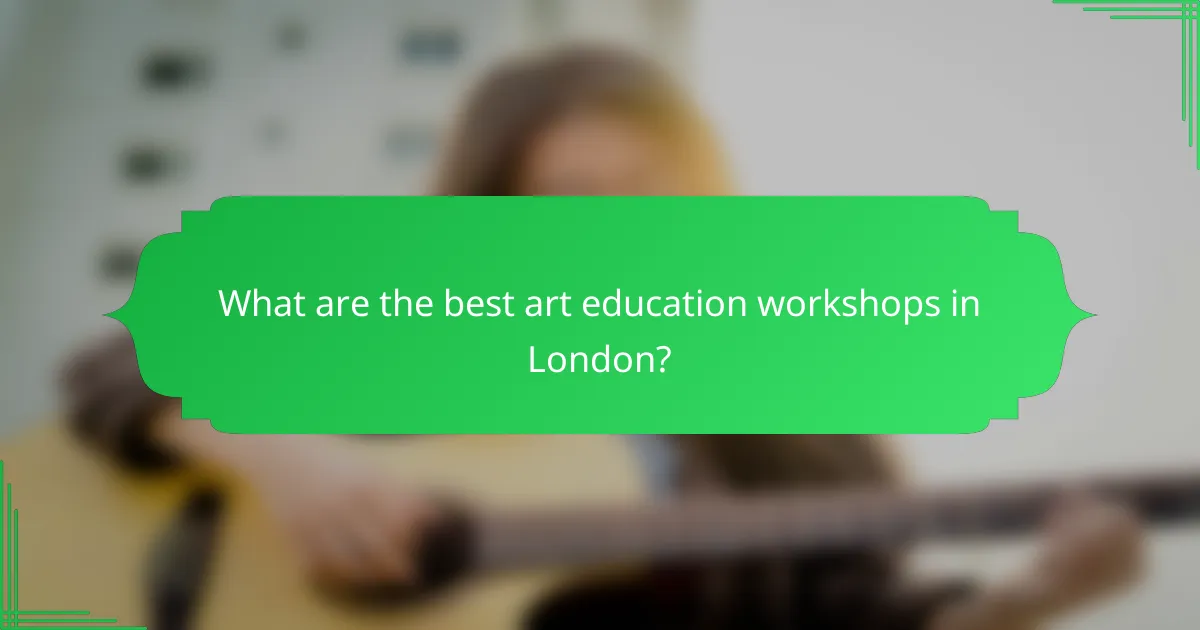
What are the best art education workshops in London?
The best art education workshops in London offer a diverse range of experiences for artists of all levels. These workshops focus on practical skills, creative exploration, and community engagement, making them ideal for anyone looking to enhance their artistic abilities.
London Art School workshops
London Art School provides a variety of workshops that cater to different artistic disciplines, including painting, sculpture, and printmaking. Participants can expect hands-on instruction from experienced artists, allowing for personalized feedback and guidance.
Workshops typically run for several weeks and may include both studio time and theory sessions. Prices can vary, but many workshops are accessible, with some offering financial assistance for students.
The Royal Drawing School workshops
The Royal Drawing School specializes in drawing workshops that emphasize observation and technique. These workshops are designed for all skill levels and often take place in inspiring locations around London.
Classes are usually small, fostering a supportive environment where participants can develop their drawing skills through practical exercises. The school also offers evening and weekend sessions, making it easier for working individuals to attend.
Central Saint Martins short courses
Central Saint Martins offers short courses that cover a wide range of artistic practices, from fashion design to fine art. These courses are typically intensive, lasting from a few days to several weeks, and are taught by industry professionals.
Participants can expect a mix of theoretical knowledge and practical application, with opportunities to showcase their work at the end of the course. Fees vary based on the course length and content, so it’s advisable to check their website for the latest offerings and pricing details.
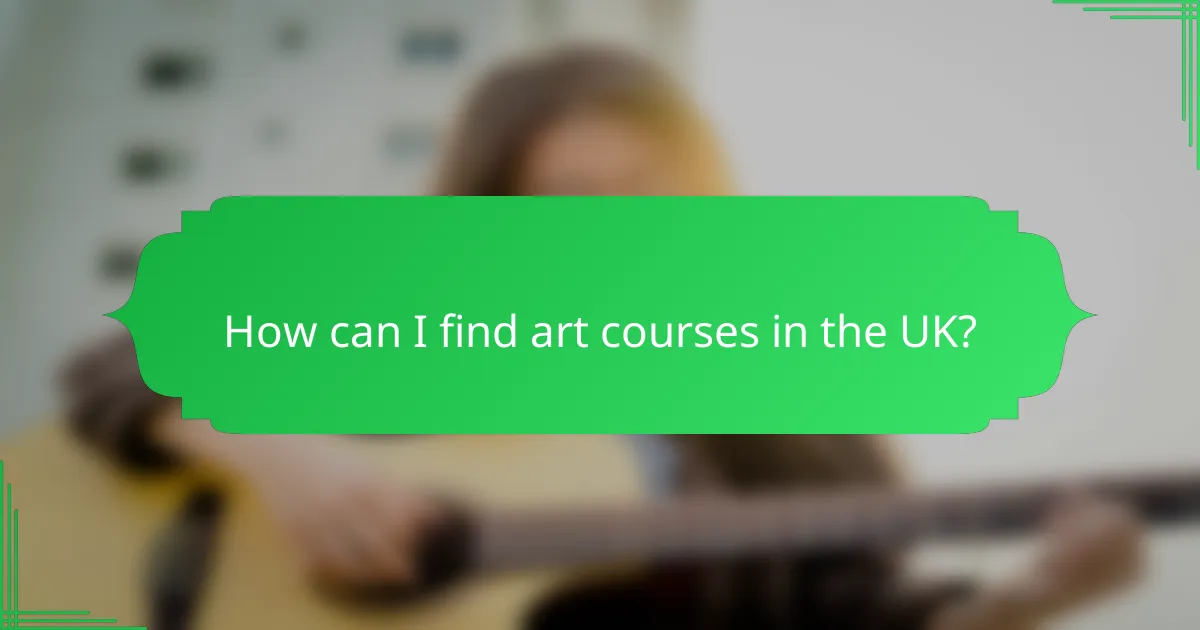
How can I find art courses in the UK?
Finding art courses in the UK can be done through various channels, including online platforms and local educational institutions. Consider your learning preferences, budget, and the type of art you wish to explore when selecting a course.
Online platforms like Coursera
Online platforms such as Coursera offer a wide range of art courses from accredited institutions. You can find courses covering topics like painting, digital art, and art history, often at your own pace.
Many courses are free to audit, with a fee required only if you want a certificate. This flexibility allows you to explore different styles and techniques without a significant financial commitment.
Local community colleges
Local community colleges in the UK often provide affordable art courses that cater to various skill levels. These courses typically include hands-on workshops and may cover subjects like drawing, sculpture, and photography.
Enrolling in a community college can also foster connections with local artists and peers, enhancing your learning experience. Check the college’s website for course schedules and fees, which usually range from a few hundred to a couple of thousand pounds, depending on the course length and materials included.
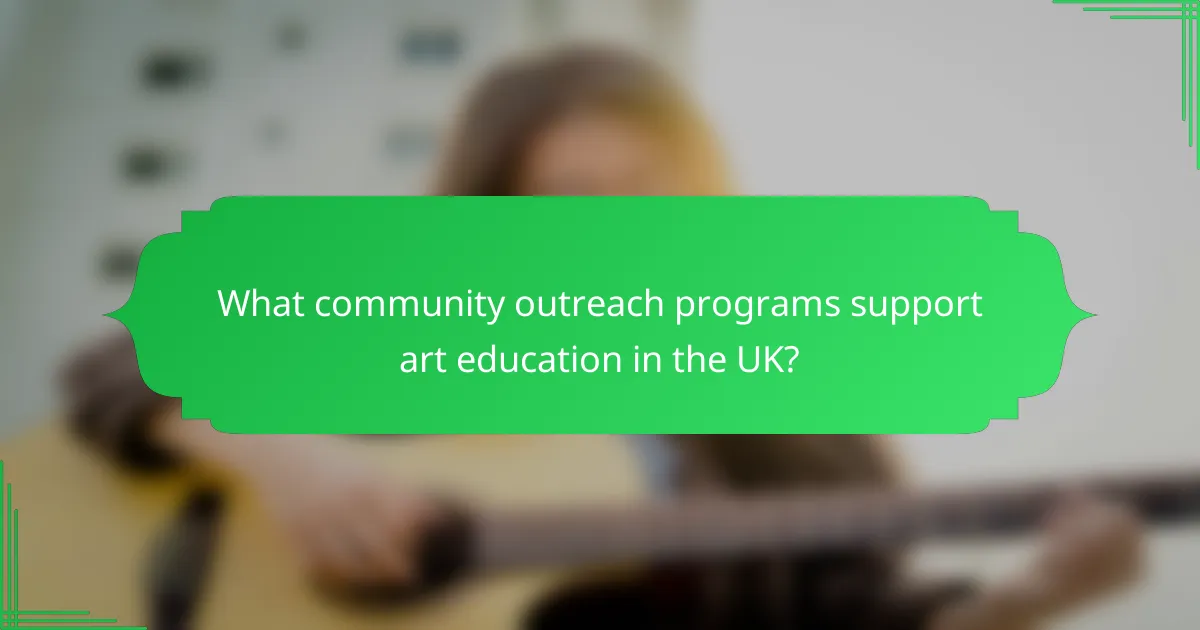
What community outreach programs support art education in the UK?
Community outreach programs in the UK play a vital role in enhancing art education by providing access to creative opportunities for diverse populations. These initiatives often focus on engagement, skill development, and fostering a love for the arts among participants of all ages.
Art in the Park initiatives
Art in the Park initiatives are community-driven events that bring art activities to public parks, making them accessible to everyone. These programs typically include workshops, exhibitions, and interactive sessions led by local artists, encouraging participation from families and individuals.
Participants can explore various art forms, such as painting, sculpture, and performance art, often at no cost. These initiatives not only promote creativity but also strengthen community bonds by encouraging collaboration and social interaction.
Local art charities like Art Against Knives
Local art charities, such as Art Against Knives, focus on using art as a tool for social change and education. They provide workshops and programs aimed at young people, particularly in areas affected by violence and social issues, helping them express themselves through creative outlets.
These charities often collaborate with schools and community centers to deliver tailored art education that addresses specific local needs. By engaging youth in meaningful artistic projects, they foster personal development and community resilience while raising awareness about important social issues.
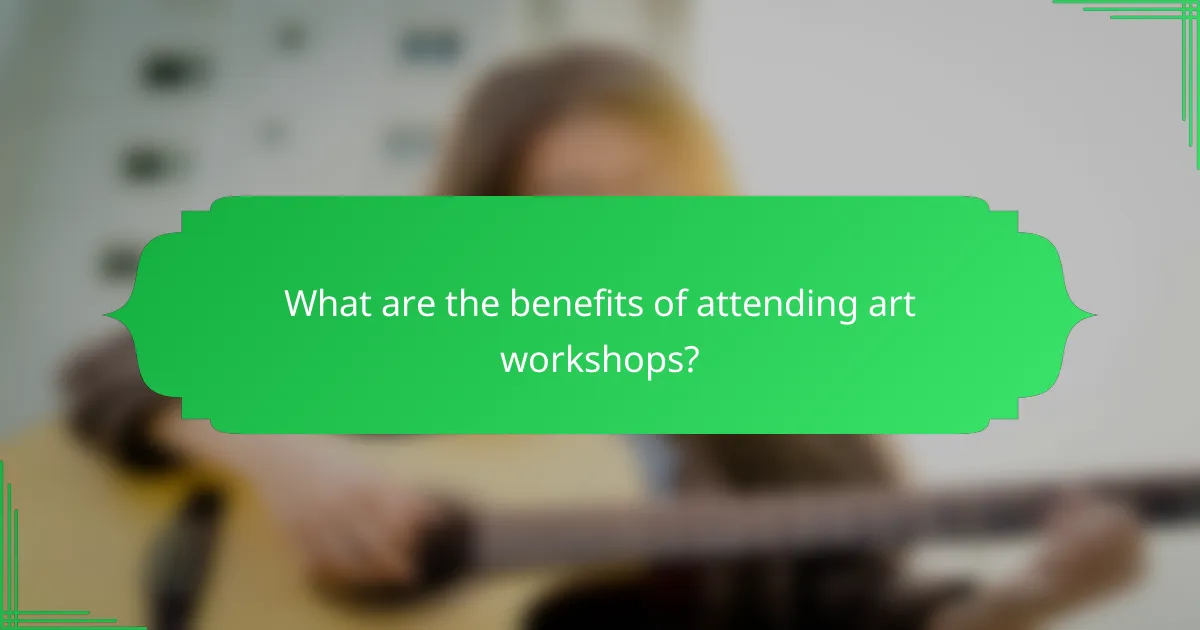
What are the benefits of attending art workshops?
Attending art workshops offers numerous advantages, including enhanced skills and valuable connections within the art community. These workshops provide hands-on experiences that can significantly boost creativity and technical abilities.
Skill development
Art workshops are designed to improve specific skills, ranging from basic techniques to advanced methods. Participants often engage in practical exercises that allow them to experiment with different mediums, such as painting, sculpture, or digital art.
For instance, a painting workshop might focus on color mixing and brush techniques, while a sculpture workshop could emphasize form and texture. Regular participation can lead to noticeable improvements in artistic proficiency.
Networking opportunities
Workshops serve as excellent venues for networking with fellow artists, instructors, and industry professionals. Building relationships in these settings can lead to collaborations, mentorships, and even job opportunities.
Attendees can exchange contact information and share their portfolios, which is crucial for expanding their professional circles. Engaging with a diverse group of creatives can also inspire new ideas and artistic directions.

How do I choose the right art course for my needs?
To choose the right art course, start by identifying your specific goals, whether it’s skill improvement, professional development, or personal enjoyment. Consider factors like your current skill level, course duration, and preferred learning format to ensure the course aligns with your needs.
Assess your skill level
Understanding your skill level is crucial when selecting an art course. Beginners may benefit from foundational courses that cover basic techniques, while intermediate or advanced artists might seek specialized workshops to refine their skills or explore new mediums.
To assess your skill level, reflect on your previous experience with art, the types of projects you’ve completed, and any feedback you’ve received from instructors or peers. This self-evaluation will help you choose a course that challenges you appropriately without being overwhelming.
Consider course duration and format
Course duration and format significantly impact your learning experience. Short workshops may provide intensive, focused training on specific techniques, while longer courses often offer a more comprehensive exploration of topics over several weeks or months.
Think about how much time you can realistically commit. If you have a busy schedule, a weekend workshop or an online course with flexible deadlines might be ideal. Conversely, if you can dedicate more time, consider enrolling in a semester-long class that allows for deeper engagement and practice.

What are the costs associated with art education in the UK?
The costs of art education in the UK can vary significantly based on the type of program, institution, and location. Generally, students should expect to budget for workshop fees and tuition for accredited courses, both of which can differ widely.
Workshop fees
Workshop fees in the UK typically range from £30 to £150 per session, depending on the instructor’s experience and the materials provided. Many community centers and local artists offer affordable options, while specialized workshops may charge more for expert guidance.
When considering workshops, look for those that include materials in the fee, as this can save additional costs. Some workshops may offer discounts for early registration or group bookings, making them more accessible.
Tuition for accredited courses
Tuition for accredited art courses in the UK can range from £9,000 to £20,000 per year for undergraduate programs, depending on the institution and location. Postgraduate courses may cost between £10,000 and £25,000 annually. Students should also factor in additional costs such as materials, equipment, and living expenses.
Many universities offer financial aid, scholarships, or payment plans to help manage tuition costs. It’s advisable to research various institutions and their offerings to find the best fit for both budget and educational goals.
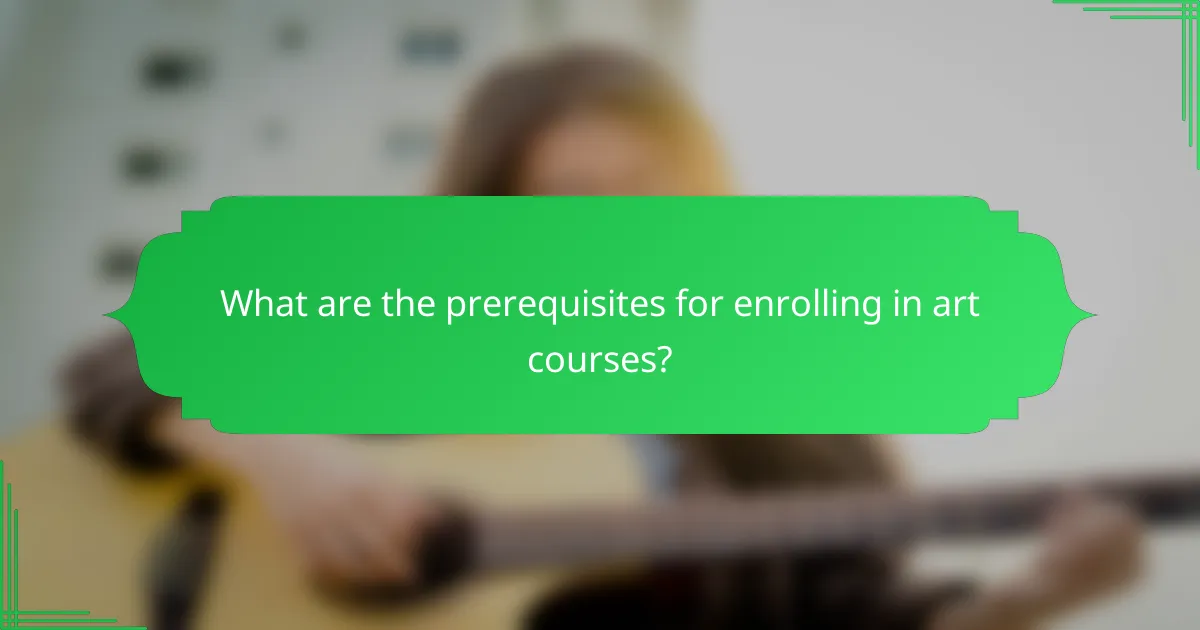
What are the prerequisites for enrolling in art courses?
Prerequisites for enrolling in art courses typically include a portfolio submission and having basic art supplies. These requirements help instructors assess students’ skills and ensure they are equipped for the course material.
Portfolio submission
A portfolio submission is often required to demonstrate your artistic abilities and style. This collection usually includes a range of your best works, showcasing different techniques and mediums.
When preparing your portfolio, aim for 10 to 15 pieces that reflect your growth and versatility. Include a mix of completed projects and sketches to give a comprehensive view of your skills.
Basic art supplies
Having basic art supplies is essential for participating in most art courses. Common supplies include sketchbooks, pencils, erasers, paints, brushes, and canvas, depending on the course focus.
Before enrolling, check the course syllabus for specific supply lists. Investing in quality materials can enhance your learning experience and the final results of your projects.
